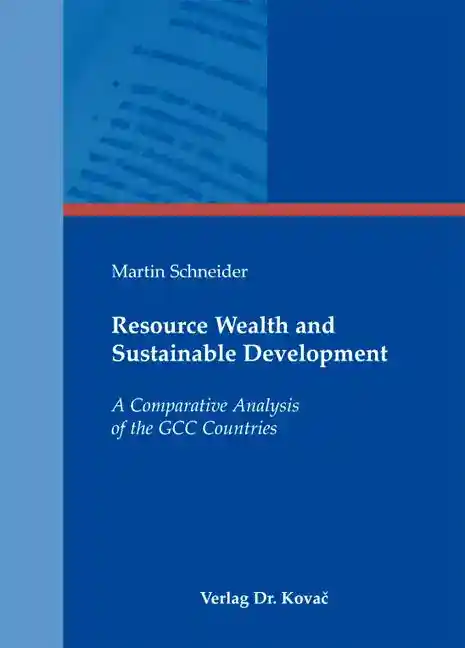Martin SchneiderResource Wealth and Sustainable Development
A Comparative Analysis of the GCC Countries
Studienreihe Volkswirtschaften der Welt, Band 27
Hamburg 2013, 430 Seiten
ISBN 978-3-8300-7047-4 (Print)
ISBN 978-3-339-07047-0 (eBook)
Zum Inhalt
Natural resource-rich countries that are dependent on revenues generated from the sale of the resources, such as the Gulf Cooperation Council countries Bahrain, Kuwait, Oman, Qatar, Saudi Arabia and the United Arab Emirates face several challenges. They can be classified as challenges arising by nature (non-renewability and depletability) and by dependence on the natural resource. The challenges arising from dependence on resources are described in the resource curse literature. This line of literature argues that countries dependent on natural resources grow, on average, at a slower rate than their resource scarce counterparts. The reasons for the poorer performance of resource affluent countries are manifold (transmission channels), including volatility or the negligence of human development. However, natural resources also provide opportunities in the form of resource rents and reserves.
Sustainable development (along with the prerequisites of structural change and national competitiveness) is the approach required to overcome problems associated with resource dependence and to ensure that resource rents and reserves are deployed in a suitable manner.
Three research questions are examined in this study. First, are resources a blessing or curse for the Gulf states? The assessment includes the applicability of debilitating transmission channels that existing literature has found to be important for the relationship between resource dependence and growth. Second, has development been (weakly) sustainable in the GCC countries? Third, can current national competitiveness be characterized as sustainable competitiveness?
This study reveals some new results that complement and enlarge on the findings of existing studies in a variety of ways. Based on an empirical cross-country study, it is found that oil and gas rich countries did not substitute their natural capital adequately. It is shown that this negative relationship applies to all GCC countries for which data was available. Moreover, it is demonstrated that there is a significant difference between national competiveness as measured today and sustainable competitiveness.
Schlagworte
GCC CountriesGulf StatesHartwick RuleNational CompetitivenessResource CurseSustainable CompetitivenessSustainable DevelopmentVolkswirtschaftslehreIhr Werk im Verlag Dr. Kovač
Möchten Sie Ihre wissenschaftliche Arbeit publizieren? Erfahren Sie mehr über unsere günstigen Konditionen und unseren Service für Autorinnen und Autoren.
